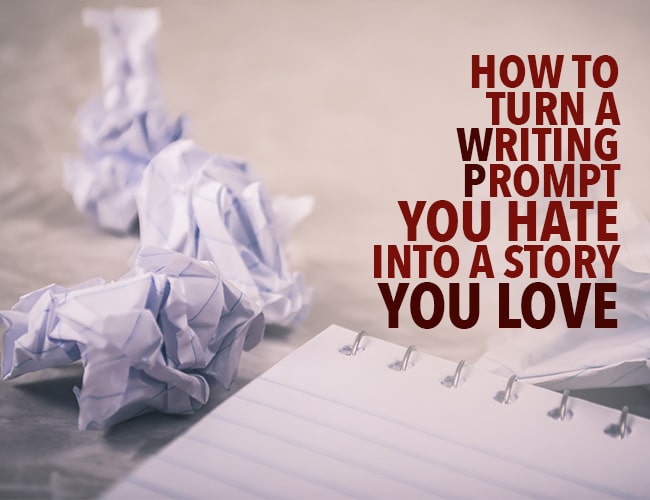There’s no shortage of writing prompts out there. We even do them with every post here at the Write Practice. But if you've ever felt uninspired by a prompt, you know how hard it can be to get started. Today I wanted to show you how to take a prompt that you hate and turn it into a story you just might love.

Prompts have a place in writing, whether it’s overcoming writer’s block or simply as a warmup to get your brain moving. Writing prompts are awesome.
Until they’re not.
What do you do if you hate the writing prompt you’re given?
Sometimes Writing Prompts Are Awful
I was recently invited to participate in a short story anthology. It’s a big deal to be personally invited, and I was super excited to be given the opportunity. I giddily accepted the offer right away.
And then I was given my writing prompt. The prompt was super restrictive and a little out of my comfort zone. And I hated it.
I couldn’t turn back, though. I’d already committed to writing a story, and it really was an awesome opportunity.
I had to push through and get that story written.
5 Tips to Turn a Terrible Prompt Into a Brilliant Story
Read on for my top five tips on how to write for a prompt you hate:
(And if you need a refresher on how to write a short story, check out my full guide here.)
Tip #1: Word association/brainstorming
The first thing I do when I’m stuck is clear a space on my wall and write the prompt in the center. (I have a giant chalkboard. No paint was harmed in this process.)
I pace in front of the wall and write down anything that comes to mind. Questions. Synonyms. (The dictionary is your friend.) What ifs. Sometimes one-sentence rants about how much I hate the prompt or how crappy of a writer I am.
I write literally everything that comes to mind. Normally, this is where this process stops. By the end of an hour or two, I’ve got something.
This time, my chalkboard failed me. I had nothing but a bunch of scribbling, so I took more drastic measures.
Tip #2: Come at it from a different angle
Rules are important in writing. The set the edges and let us know what our boundaries are. Prompts are simply rules. “We’re writing this now, not anything else.”
Rules are restrictive by nature and many prompts are as well. Sometimes too restrictive.
Rules are also meant to be broken, especially when it comes to art.
The last thing your editor wants when giving you a prompt is for you to take it too literally. Be creative. Think outside the box. Don’t give your editors the same tired story they’re going to read a thousand times.
Try writing in a different genre or writing from an unexpected perspective.
Tip #3: Let it stew
Take a step back and work on something else. Go for a walk or run. Do something else creative. Eat chocolate.
Your brain will continue to mull over the problem while you focus your conscious mind on something else. If you’re lucky, you’ll have an epiphany in the middle of talking to someone about socks and the words will flow.
Tip #4: Roll dice
In this case, I mean literally. I have several writing aids I’ve gotten as gifts over the years. One of them is a box of Story Cubes, a collection of dice with pictures on all sides. The idea is to provide your brain with visual stimulation so you can piece together problems without the hindrance of words.
You can also try other “prompts” like title or name generators online, look through a ton of photos, or try out The Storymatic game. Whatever random ideas these things give you can be applied to the writing prompt you’re supposed to be writing on.
Tip #5: Ask others
Bouncing ideas off others is one of my favorite ways to move past a block and get the thing written.
No, this isn’t cheating.
It might feel like it’s taking the easy way out, but you have to remember you’re the one doing the writing. The other person is simply firing off ideas and it’s your job to see which one sticks and to run with it. Think of it as inspiration instead of stealing ideas.
(Do let them know what it’s for, though. Don’t actually steal an entire story idea.)
Problem Solved
I used a combination of these tips to push through and get the story written. This time asking others was the one thing that really sparked my imagination and got me moving. Letting it stew and rolling the dice really cemented the idea and helped me push through that first draft.
I’m pretty satisfied with the resulting story. (Though I’m glad to say sayonara to this particular prompt.)
Writing on an awful prompt can help you hone your skills as a writer. You’re forced to think in different ways and to push yourself in new directions. You learn how to bend the rules while still staying in the confines of the prompt.
The next time you see a writing prompt and think Yuck! write on it anyway. You might be surprised what you learn about yourself and your writing process.
Do you love writing prompts or love to hate them? Let me know in the comments!
PRACTICE
Go here and choose a writing prompt that doesn’t immediately speak to you. You don’t have to completely hate it, but you shouldn’t be excited about writing on it.
Spend fifteen minutes brainstorming for the prompt. If something sparks, go with it and get writing!
Share the prompt you chose and your brainstorming session and/or writing in the Pro Practice Workshop and don't forget to comment on your fellow writers' work! Not a member? Join us.
Sarah Gribble is the author of dozens of short stories that explore uncomfortable situations, basic fears, and the general awe and fascination of the unknown. She just released Surviving Death, her first novel, and is currently working on her next book.
Follow her on Instagram or join her email list for free scares.




0 Comments